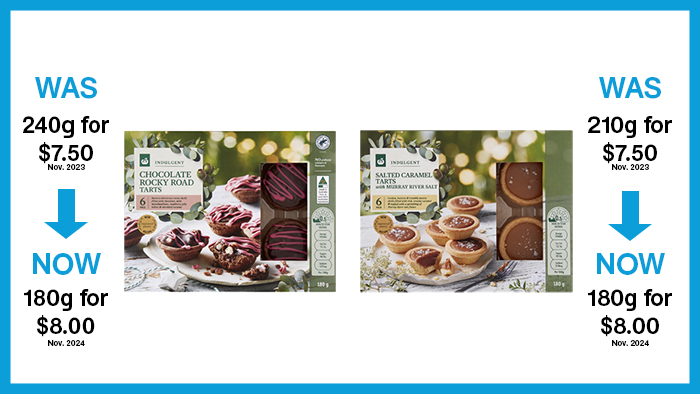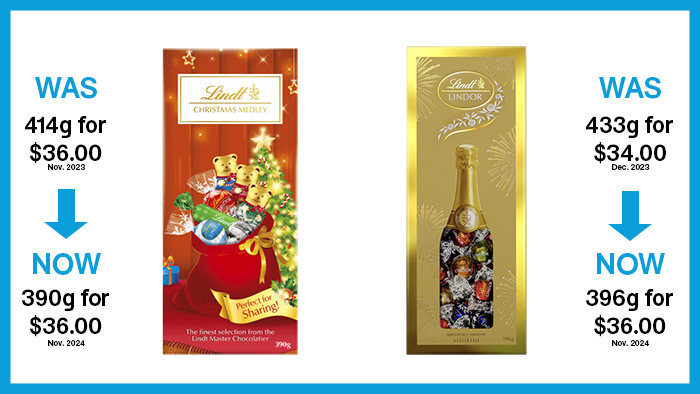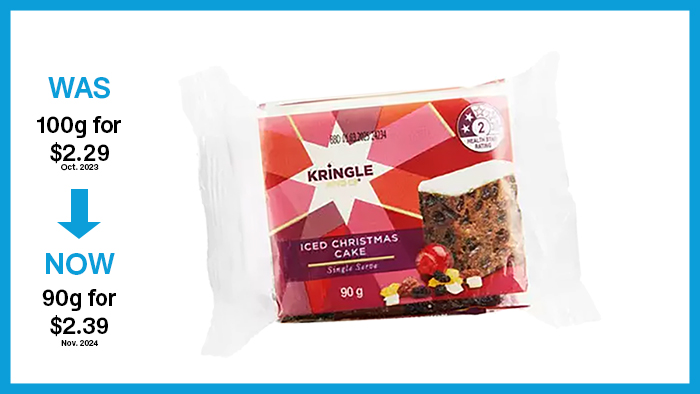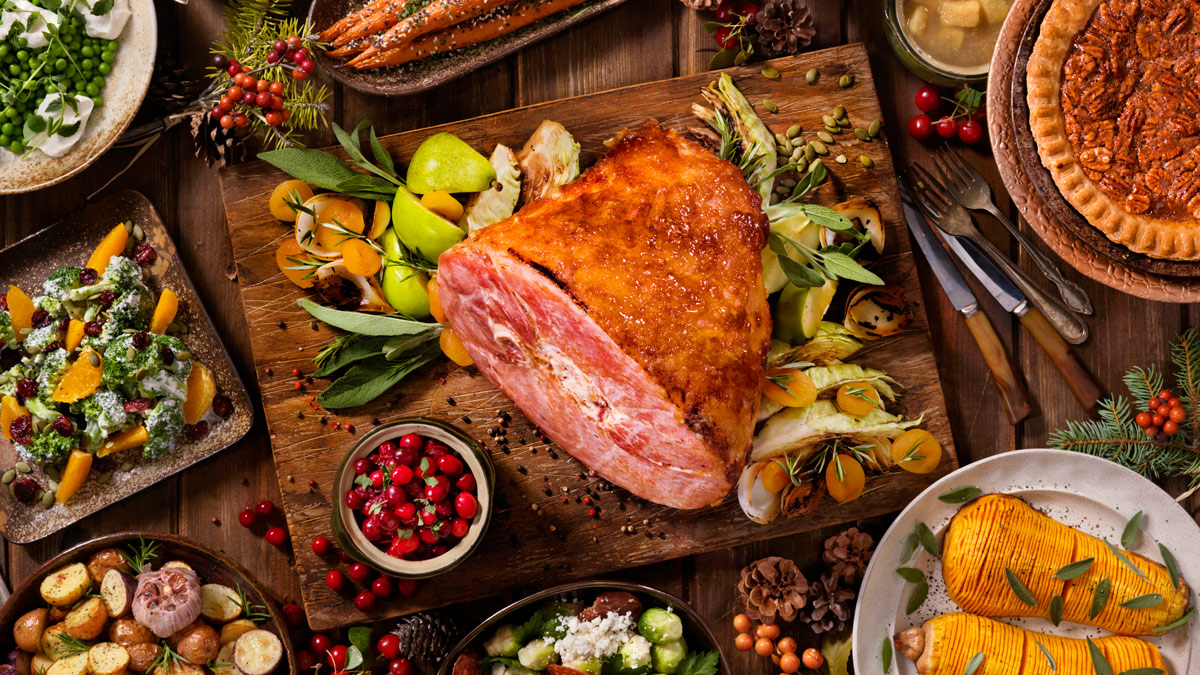Get our independent lab tests, expert reviews and honest advice.
Five festive foods hit by Christmas shrinkflation

Need to know
- CHOICE has uncovered five food items that have recently shrunk, while their prices have risen or stayed the same
- These include products popular at Christmas, such as chocolates, cakes and tarts
- Manufacturers blame rising costs and changing tastes, as the government promises to crack down on shrinkflation
As consumers and governments around the world rail against shrinkflation, Christmas products are among the latest to become smaller and more expensive.
CHOICE has uncovered five festive foods that have recently shrunk, while their prices have risen or stayed the same.
The manufacturers of these items are blaming rising production costs and changing customer tastes, but CHOICE believes retailers should be doing more to help consumers spot shrinkflation.
Growing frustration at shrinking groceries
Shrinkflation is when a manufacturer reduces the size of an item, but doesn’t extend this cut to the price, meaning consumers end up paying the same amount – or in some cases, even more – for less product.
CHOICE supporters have been expressing frustration at the practice for years, but now politicians are also increasingly calling it out, as Australians continue to experience a cost-of-living crisis.
Just this year, the federal government promised it would soon be cracking down on the phenomenon.

Since our last shrinkflation investigation, supermarkets – some of which have given the shrinkflation treatment to their own home brand items – have been grilled by the ACCC over the practice and whether they could be doing more to protect consumers from it.
In the meantime, shrinkflation is hitting Australians already struggling with the cost of food and groceries. CHOICE Consumer Pulse data from September shows 87% of households were concerned by how much they were spending on these goods.
CHOICE senior campaigns and policy adviser Bea Sherwood says the latest round of shrinkflation exposed by CHOICE will cut into consumers’ purchasing power at a time when we’re opening our wallets for the festive season.
“Consumers will be heading to the shops this Christmas surprised to see that some of their favourite holiday products are not only smaller, but more expensive,” she says.
“This is just another way that the major supermarkets and food manufacturers are letting consumers down, with many people trying to stretch their budgets at this busy time of year.”
Christmas shrinkflation revealed
Many of the latest shrinkers we’ve uncovered will likely be popular choices for those stocking up for this year’s festivities.
But they’re also just a few of the potentially numerous examples of shrinkflation impacting products on our shelves.
Have you seen more examples of Christmas shrinkflation other than those below? Let us know on the CHOICE Community Forum or contact the author
Woolworths festive foods feel the pinch
Woolworths own-brand tarts are among our latest shrinkflation examples, with two different varieties of these popular festive treats becoming smaller and more expensive.
In the lead up to Christmas last year, Woolworths was selling its home brand Rocky Road and Salted Caramel tarts in 240g and 210g packets, respectively.
Both products are now only available in 180g packets and have seen their price increase from $7.50 to $8.
Woolworths says the shift to lighter tarts was ‘primarily driven by customer feedback requesting a finer, crispier shell’
The changes have hit buyers of the rocky road variety particularly hard – they’re now paying 42% more per 100g of the sweet treats than they did last year.
Woolworths says the shift to lighter tarts was “primarily driven by customer feedback requesting a finer, crispier shell”.
The supermarket says the increases in price, meanwhile, were the result of rising production costs, some of which stemmed from the higher price of cocoa, which spiked to record levels earlier this year.

Lindt chocolates getting lighter
Shrinkflation isn’t just caused by supermarkets cutting back on their own-brand ranges – flagship international manufacturers are also scrimping on their offerings.
One of these is Swiss chocolate giant Lindt & Sprüngli, which has reduced the heft of some of its packaged Lindt chocolate products.
The Christmas Medley Bag has shrunk in size, with the RRP staying at $36
Included are varieties destined to be shared over the festive season, such as the Christmas Medley Bag, which shrunk from 414g in November last year to 390g this year, with the RRP staying at $36.
Meanwhile, the company’s Limited Edition Champagne Gala Box has become even more limited, going from 433g for $34 to 396g for $36 over a similar period.
Lindt says high cocoa prices are behind the cutbacks, with the company reducing packet sizes and raising prices to compensate for this larger overhead.

Christmas cake loses mass
Few foods symbolise Christmas more than the cake that carries its name, but even this traditional favourite isn’t safe from shrinkflation.
Discount supermarket Aldi sells single servings of iced Christmas cake under its Kringle & Co brand during the festive season.
But the 90g version currently advertised is lacking something – namely the extra 10g it had last year.
The current iteration is also more expensive at $2.39. The 100g serving was being sold for $2.29 last October.
Aldi didn’t explain why it reduced the size of its cake, but says it understands that shrinking its products is unpopular with customers and it only does this when completely necessary.

What’s being done about shrinkflation?
Governments have recognised the frustration shrinkflation causes shoppers and the toll this hidden form of inflation takes on their wallets.
Earlier this year, the federal government announced it will be “cracking down” on the practice by strengthening the rules for how supermarkets display unit pricing – the breakdown of how much an item costs per 100g or 100ml.
The government wants to improve the readability and visibility of these prices, address inconsistencies among the units of measurement used, and introduce penalties for supermarkets that break unit pricing rules.
We need labels on shelves notifying shoppers when a product has shrunk but the price remains the same or has increased
Bea Sherwood, CHOICE Campaigns
“While CHOICE welcomes proposed changes to fix unit pricing, they should go further to make it crystal clear to consumers when a product has been affected by shrinkflation,” says Sherwood.
“We need labels on shelves notifying shoppers when a product has shrunk but the price remains the same or has increased.”
Australian retailers wouldn’t be the first to do this – French supermarket chain Carrefour used signage to draw attention to shrinkflation affecting certain products last year.





